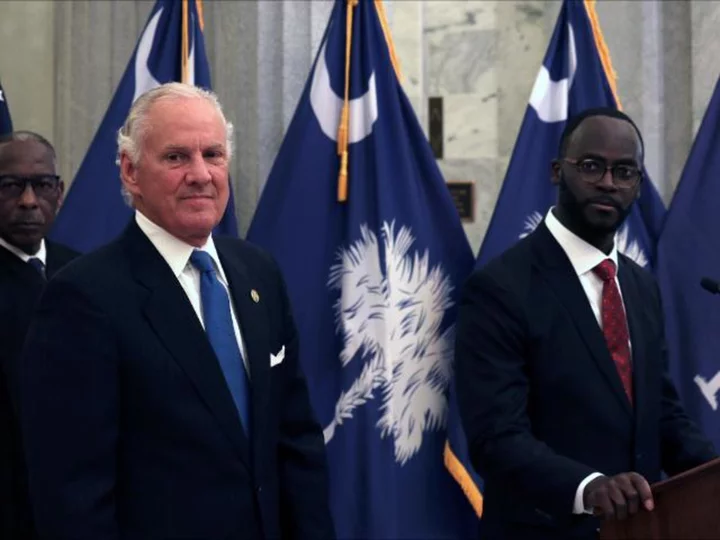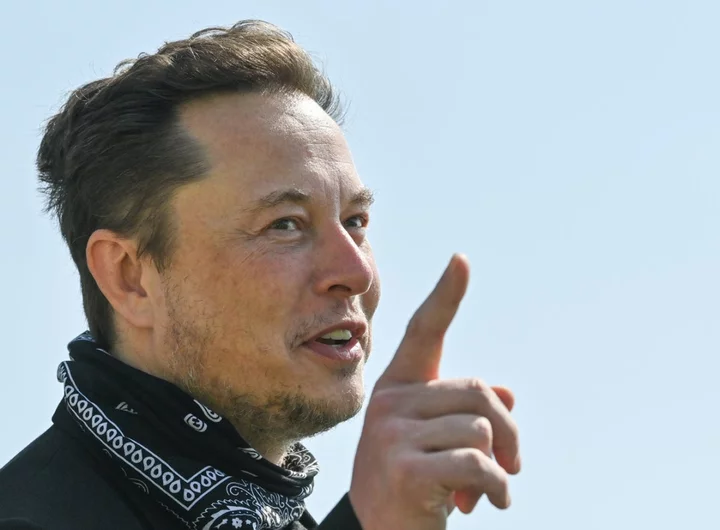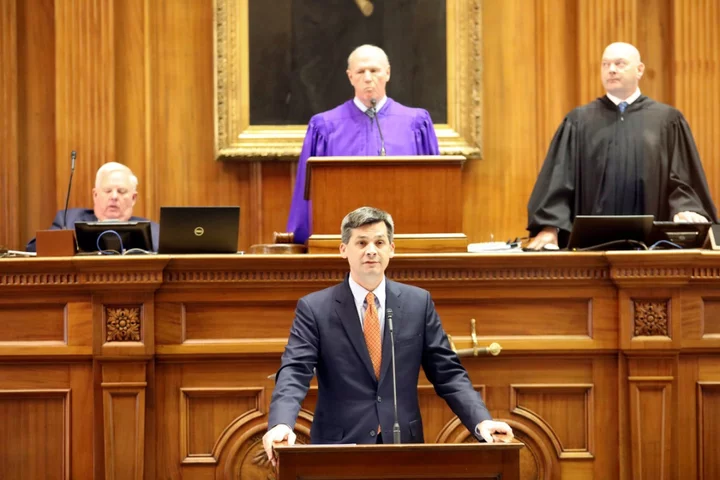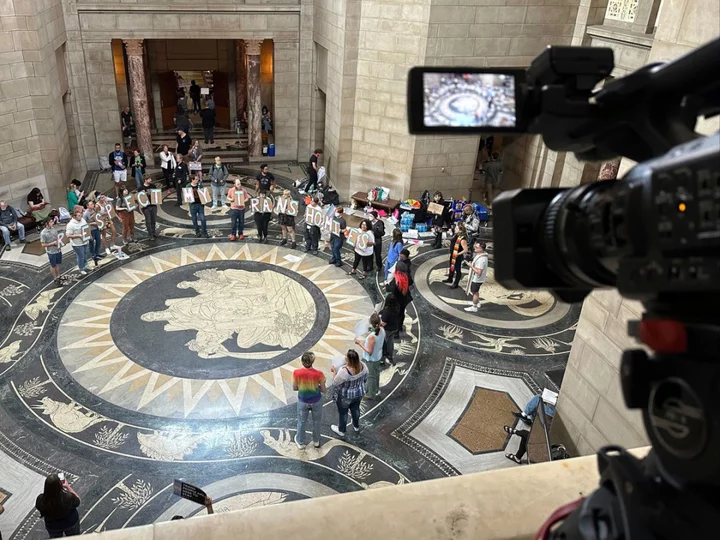
South Carolina enacts six-week abortion ban, threatening access across entire South
The state of South Carolina has outlawed abortion at roughly six weeks of pregnancy, extending the sweeping restrictions and outright bans on abortion care across the entire US South, and threatening legal access to care for millions of Americans. Republican Governor Henry McMaster signed legislation into law on 25 May after the bill’s final passage earlier this week. It goes into effect immediately. Republican lawmakers in neighbouring North Carolina recently voted to override the Democratic governor’s veto of a bill outlawing abortion at 12 weeks of pregnancy, restricting abortion access in a state that has been a haven for abortion care in the year after the US Supreme Court’s decision to reverse Roe v Wade. More than a dozen states, mostly in the South, have outlawed most abortions or severely restricted access within the year after the Supreme Court’s ruling in Dobbs v Jackson Women’s Health Organization, which revoked a constitutional right to abortion care that was affirmed for nearly half a century. Abortion rights restrictions in North Carolina and a six-week ban in South Carolina dramatically change the map for abortion access in the US, where abortions are banned in most cases from Texas to West Virginia and along the Gulf Coast, making legal access to care out of reach altogether across the Deep South. Abortion rights advocates and civil rights groups have filed a lawsuit to challenge South Carolina’s law in court. The lawsuit comes just four months after the state’s Supreme Court permanently struck down a nearly identical law, which the court determined ran afoul of the state’s constitution. Restrictions on abortion care “must be reasonable and it must be meaningful in that the time frames imposed must afford a woman sufficient time to determine she is pregnant and to take reasonable steps to terminate that pregnancy,” Justice Kaye Hearn wrote in the majority opinion on 5 January. “Six weeks is, quite simply, not a reasonable period of time for these two things to occur,” the judge added. Jenny Black, president and CEO of Planned Parenthood South Atlantic, said in a statement that South Carolina lawmakers “have once again trampled on our right to make private health care decisions, ignoring warnings from health care providers and precedent set by the state’s highest court just a few months ago.” “The decision of if, when, and how to have a child is deeply personal, and politicians making that decision for anyone else is government overreach of the highest order,” she added. “We will always fight for our patients’ ability to make their own decisions about their bodies and access the health care they need. We urge the court to take swift action to block this dangerous ban on abortion.” Governor McMcaster has pledged to defend the law in court. “We stand ready to defend this legislation against any challenges and are confident we will succeed,” he said in a statement. “The right to life must be preserved, and we will do everything we can to protect it.” Read More Mother forced to give birth to stillborn son joins lawsuit against Texas abortion ban Senator who voted for anti-trans bill that passed by one vote admits she wasn’t paying attention Twitter's launch of DeSantis' presidential bid underscores platform's rightward shift under Musk Timeline: How Georgia and South Carolina nuclear reactors ran so far off course Georgia nuclear rebirth arrives 7 years late, $17B over cost
2023-05-26 00:29

South Carolina governor signs 6-week abortion bill into law
South Carolina Gov. Henry McMaster on Thursday signed a bill into law that will limit most abortions as early as six weeks into a pregnancy.
2023-05-25 23:29

Supreme Court rolls back federal safeguards for wetlands under Clean Water Act
The Supreme Court on Thursday cut back on the Environmental Protection Agency's ability to regulate wetlands under the Clean Water Act, rolling back federal safeguards in a long-running dispute between the government and a couple who owns property in Idaho.
2023-05-25 22:28

From self-proclaimed ‘socialist’ to Team Trump and DeSantis: Elon Musk’s curious politics revealed
“I prefer to stay out of politics." Those were Elon Musk’s words when forced in September 2021 to respond to a claim by Texas governor Greg Abbott that he supported the state’s anti-abortion laws. If he really does prefer to stay out of politics, however, Musk has a funny way of showing it. Over his many years of fame as the chief executive of Tesla, SpaceX, and now Twitter, the South African-born tycoon has attacked everyone and everything from Donald Trump and Bernie Sanders through individual regulatory officials to Covid rules, trade unions, and "pronouns". Since 2022, his public political stances have taken a sharp rightward turn as he declared his support for the Republican Party, aligned himself with far-right activists on Twitter, disparaged transgender rights, embraced conservative conspiracy theories, and pledged to save civilisation from the “woke mind virus”. His activities appear to have earned him the patronage of Florida’s GOP governor Ron DeSantis, who was announcing that he is running for president during a conversation with Musk in Twitter’s audio panel service Spaces on Wednesday 24 May. It is a striking departure from the 51-year-old’s aproach to politics before the Covid pandemic, when he carefully triangulated between left and right and donated to both Democrats and Republicans while variously declaring himself a “moderate”, a “socialist”, and “socially liberal and fiscally conservative”. Yet despite evidence to the contrary, Musk still claims to be an independent who is “neither conventionally right nor left” and committed to healthy debate. So what does Elon Musk really believe? And – given that he is both one of the world’s richest people and the owner of one of its largest social networks – what does that mean for the rest of us? Embracing the Republican Party Let’s start with Musk’s recent support for the US Republican Party, which has been clear and unambiguous, if not without caveats. “In the past I voted Democrat, because they were (mostly) the kindness party. But they have become the party of division and hate, so I can no longer support them and will vote Republican,” he said in May. This came after months of criticism of President Joe Biden, which included hammering his flagship infrastructure and social spending bills for granting subsidies to the electric car industry and increasing the “insane” federal budget deficit. Musk later called the president a “damp sock puppet in human form”. In June 2022, Musk went further, revealing he had voted for Republican congressional candidate Maya Flores in a special election – the first time, he claimed, that he had ever cast a vote for the GOP. “Massive red wave in 2022,” Musk tweeted, though it was unclear if he meant this as a prediction or a rallying cry. Florida governor Ron DeSantis joked about the South African-born billionaire’s comments: “I’m focused on 2022, but with Elon Musk, what I would say is I welcome support from African Americans. What can I say?” Despite all this, Musk has stopped short of declaring his permanent support for the party as a whole. Following his tweet about the special election, one Twitter user asked: “I assume Republican for president [too]?” “[To be determined],” Musk replied. “What are you leaning towards?” he was asked in a follow-up question. “DeSantis,” he said. Similarly, the mogul’s endorsement of the Republican Party on the day before the US midterms in November 2022 was somewhat qualified. “To independent-minded voters: Shared power curbs the worst excesses of both parties,” he told his his 115 million Twitter followers. “Therefore I recommend voting for a Republican Congress, given that the presidency is Democratic. Hardcore Democrats or Republicans never vote for the other side, so independent voters are the ones who actually decide who’s in charge!” After the election, Musk added: “To be clear, my historical party affiliation has been Independent, with an actual voting history of entirely Democrat until this year. And I’m open to the idea of voting Democrat again in the future.” A self-proclaimed ‘centrist’ who donates to both paties Musk’s caveats about supporting the GOP echo his longstanding claim to be a “centrist” or an “independent” who does not fit into traditional boxes of left or right. For years, he has offered varying definitions of his own politics. His most consistent theme has been that he is “socially liberal and fiscally conservative”, or even “socially very liberal”. In 2020, he put it this way: “I’m socially very liberal. And then economically right of center, maybe, or center. I don’t know. I’m obviously not a communist.” In 2018, he described himself as “a utopian anarchist of the kind best described by Iain Banks”, referring to the late Scottish sci-fi author who wrote longingly (if sceptically) of a space-faring anarcho-socialist civilisation called the Culture, which has no money, no poverty, no wage labour, no police, no prisons, no standing army, and nearly infinite abundance of basic goods. At another point Musk claimed to be a “socialist”, but “not the kind that shifts resources from most productive to least productive”. He later said we should not take what he’d said too seriously. In April 2021, he posted a stick figure cartoon on Twitter that depicted political moderates, including himself, standing still on the political spectrum while the left accelerates away into extremism, dragging the centre ground away and making moderates appear right-wing by comparison. The following November, he professed himself “neither conventionally right nor left”, and in December remarked: "You know Twitter is being fair when extremists on far right and far left are simultaneously upset!" Musk’s political donations offer some support for this. According to data gathered by the non-profit lobbying watchdog Open Secrets, Elon Musk has given a total of $1.2m to politicians, parties, political action committees (PACs), and referendum campaigns since 2002. That money went almost equally to Democrats, with $542,000, and Republicans, with $574,500, with another $85,000 going to two broadly left-wing referendum campaigns in California. The balance has fluctuated over the years: in 2006, 2013 and 2017 he donated overwhelmingly to Republicans, while in 2015 he gave exclusively to Democrats. He has also given a total of $30,000 to a PAC set up by SpaceX, which donated 54 per cent of its total to Democrats and 46 per cent to Republicans. Many of the individual politicians he gave to were state legislators in California, where Tesla was formerly based, and Texas, where SpaceX has long maintained rocket testing and launch facilities. Musk donated to more individual Democratic politicians than to Republicans, and often praised specific Democrats in a way he has rarely done with their opponents. Way back in 2005, he gave $10,000 to California’s Proposition 82, a proposal to increase taxes on the rich to pay for universal pre-school for four-year-olds, although it did not pass. When Donald Trump was a candidate for the Republican nomination, Musk said of him: “I feel a bit stronger that he is probably not the right guy. He doesn’t seem to have the sort of character that reflects well on the United States.” Musk says he voted for Joe Biden in 2020. Meanwhile, SpaceX itself has spent about $9.7m on lobbyists and Tesla has spent $5.5m. The former company relies on government contracts for much of its revenue, while the latter is subject to plenty of regulation. "SpaceX's campaign to win political support has been systematic and sophisticated," wrote the Sunlight Foundation in 2013. Musk has described these donations not as a signal of his own personal beliefs but simply as the cost of doing business in America. "In order to have your voice be heard in Washington, you have to make some little contribution," he told the Huffington Post in 2013. All of which helps explain why the first version of this article – back in December 2021 – framed Musk’s political beliefs as elusive and somewhat puzzling. Since then, however, Musk’s own behaviour has made that idea rather outdated. Elon Musk, culture warrior There’s no avoiding the obvious: Musk appears to have been thoroughly red-pilled. Originally drawn from the 1999 sci-fi film The Matrix, the “the red pill” is a phrase used by white supremacists and anti-feminists to describe the process of being radicalised into their worldview. Musk himself urged his Twitter followers to “take the red pill” in April 2020. It is a neat expression of how far down the culture war “rabbit hole” Musk has burrowed since then. He has described “wokeness” as a “mind virus” that poses a “mortal threat to civilisation”, declaring: “The woke mind virus is either defeated or nothing else matters.” In a June 2022 interview with The Babylon Bee, a conservative satire site, he said: "At its heart, wokeness is divisive, exclusionary and hateful. It basically gives mean people... a shield to be mean and cruel, armored in false virtue." In a similar vein, he mocked Twitter’s adoption in 2016 of “Stay Woke” T-shirts inspired by the 2014 Ferguson protests against police racism, claiming that the protesters’ “Hands up, don’t shoot” slogan was “made up” and that “the whole thing was a fiction”. The US Justice Department did indeed clear the officer who shot Michael Brown, but also concluded that Ferguson police had “routinely” violated citizens’ constitutional rights and discriminated against Black people. Texas governor Greg Abbott, to whom Musk donated $10,000 in 2014, has claimed that Musk “likes the social policies” of his state, which include banning almost all abortion and defining transgender healthcare for under-18s as “child abuse”. Musk rebuffed him, but ambiguously and mildly, with nothing like the fire and brimstone he has mustered against trade unions or tax proposals. Musk has also boosted right-wing conspiracy theories, claiming that health tsar Anthony Fauci should be prosecuted and sharing a groundless claim about the attack on Nancy Pelosi’s husband from a website with a history of fake news. As a homophobic hate campaign began to gather steam against one of his former employees, Yoel Roth, Musk weighed in to groundlessly imply that Roth was an enabler of child abuse. Roth subsequently suffered a torrent of abuse and threats that reportedly forced him to leave his home. That incident echoed the US right’s growing penchant for smearing political opponents, and particularly LGBT+ people, as paedophiles or “groomers”. According to the left-wing think tank Media Matters, some members of the quasi-fascist QAnon movement – which helped popularise child abuse smears as a political tactic – are convinced that Musk is one of them, albeit based on shaky evidence. On Twitter, Musk regularly interacts on friendly terms with far-right activists who traffic in hoax claims about the 2020 US election and hate speech about minority groups, sometimes soliciting their advice about how to run the site or chiming in to agree with their tweets. Perhaps this could be explained as a commitment to maintaining open discussion across political divides – except it’s hard to name any left-wingers with whom he is so pally. Musk has shown a particular antipathy to Covid lockdowns, which he once described as "fascist". He declared early in the pandemic that "the coronavirus panic is dumb" and wrongly predicted that the virus would be gone from America by the end of April 2020. He has also consistently singled out transgender people in his critiques of “wokeness”. While he has claimed to “absolutely support” trans people, he scorns the idea that anyone should be expected to use the correct pronouns when referring to them, which most trans people view as a basic act of respect that is necessary for their equal participation in society. “Forcing your pronouns upon others when they didn’t ask, and implicitly ostracising those who don’t, is neither good nor kind to anyone,” Musk said in December 2022. He has previously declared that “pronouns suck” and tweeted a meme likening cisgender people who state their pronouns on their Twitter profiles to oppressive Redcoats in colonial America. Before buying Twitter, he railed against the social network’s rules on anti-trans hate speech, which forbid users from intentionally referring to specific trans people by their birth sex (known as misgendering) or by old names they have renounced (known as deadnaming). As chief executive, Musk has reportedly made reviewing that policy a top priority. And, just after Christmas 2022, Musk liked a tweet by Libs of TikTok, a conservative Twitter account that has been accused of encouraging violence and harassment against LGBT+ people, that appeared to characterise educating children about LGBT+ issues as “confusing kids about their identity” and “stealing childhood innocence” while describing transition healthcare as “sterilising and mutilating kids”. Critics have suggested that this rhetoric may be related to Musk’s estrangement from his trans daughter, who has legally renounced his surname and said that she does not want to be related to him “in any way, shape or form.” Musk has blamed “neo-Marxists” at her university for turning her against him. Others have raised eyebrows at the fact that Musk’s former girlfriend, the electronic musician Grimes, is now in a relationship with a trans woman. All in all, it’s hard to reconcile Musk’s actions in 2022 with his claims of centrism. Nor does his alliance with pro-Trump outrage merchants say much for his once-vaunted “social liberalism”, which previously led him to favour “direct democracy” over representative democracy and advocate for the release of people imprisoned for cannabis offences. Pro-capitalist and anti-union Social policies notwithstanding, Musk remains an ardent free-marketeer who is deeply skeptical of government interventions in business. That was the basis of his attack on President Biden's Build Back Better Act in December 2021, saying the bill's tax rebate of up to $12,500 for people who buy electric cars is an "unnecessary" handout for an industry that is already taking off. He backed that up with a revealing philosophical argument about the difference between corporations and nation states. "It does not make sense to take the job of capital allocation away from people who have demonstrated great skill in capital allocation," he said, meaning business leaders, "and give it to an entity that has demonstrated very poor skill in capital allocation, which is the government. Government is simply the biggest corporation, with a monopoly on violence – and where you have no recourse. So how much money do you want to give that entity?" This libertarian-style thinking is fairly consistent for Musk. He has strongly opposed trade unions, especially in his own companies, as a barrier to efficient operations, and skirmished repeatedly with Bernie Sanders over the Vermont senator’s proposals for an income tax on billionaires. He claimed in October that Biden "seems to be controlled by unions" and in 2018 tweeted that Tesla employees who attempted to unionise would lose their stock options, which regulators have claimed was illegal. When he does endorse government intervention, Musk tends to favour measures that minimise government bureaucracy. Rather than subsidies for green industries, for example, he wants a carbon tax, and says he lobbied the Biden administration to create one. His argument is that the price of fossil fuels doesn't properly reflect their cost to the environment, meaning companies are basing their decisions on false information. Taxing carbon would correct that balance, allowing the free market to figure out in its own way how best to cut their emissions. That said, none of this stopped him from accepting billions of dollars in government subsidies for both Tesla and SpaceX. Similarly, Musk has long argued for a universal basic income to support human workers whose jobs, he believes, will soon be replaced with artificial intelligence (AI). In some ways that's a pretty left-wing idea, since it would involve spending enormous amounts of taxpayer money. But it has also been favoured by some conservatives such as Richard Nixon and free market economists such as Milton Friedman, both of whom felt it would prevent government bureaucrats deciding who deserves benefits and avoid punishing recipients for finding work. Green power has often been Musk's red line Another point of consistency has been global warming and clean energy. Back in 2006, Musk gave one of his biggest ever single donations – $75,000 – to Proposition 87, a California referendum campaign to impose a special tax on fossil fuel extractors. Since then, emissions have often been his red line. In the early years of Donald Trump's presidency, Musk joined a White House advisory council, saying that "the more voices of reason that the president hears, the better". But when Trump withdrew the US from the Paris Climate Agreement, Musk quit, saying: "Climate change is real. Leaving Paris is not good for America or the world." And when Musk was persuaded to get into Bitcoin – a natural fit, given his libertarian outlook and his penchant for technological solutions for political problems, to say nothing of his fondness for controversy – it was the currency's prodigious carbon emissions that led him to rethink. "Tesla has suspended vehicle purchases using Bitcoin," he said in May 2021. "We are concerned about rapidly increasing use of fossil fuels for Bitcoin mining and transactions, especially coal, which has the worst emissions of any fuel. Cryptocurrency is a good idea on many levels and we believe it has a promising future, but this cannot come at a great cost to the environment." Where Musk has supported Biden, that too is connected to the environment. Just after the president’s inauguration, he told Fortune: "I'm super fired up that the new administration is focused on climate... I feel very optimistic about the future of sustainable energy with the new administration." Even in his culture warrior era, Musk has stuck to this particular gun. When conservative activist Tom Fitton claimed in December 2022 that electric cars have “no impact on climate”, Musk responded, curtly: “Yeah they do.” A technocrat with astral ambitions Through all these issues runs one strain of Musk's politics that genuinely does not map onto the traditional political compass: technocracy. Back in the 1930s and ’40s, Musk’s grandfather Joshua Haldeman was the Canadian leader of the original technocratic movement, which believed in replacing both politicians and bankers with whoever had the most expertise. Elon Musk, capitalist extraordinaire, does not exactly take after his grandfather. Like the movement’s founder William Henry Smyth, though, his statements suggest a strong underlying belief that scientists and engineers can solve political problems that are intractable to others. As the historian Jill Lepore has argued, Musk inspires numerous followers with an exotic brand of techno-capitalism that she calls "Muskism". She says that many of its ideas are drawn from science fiction, sometimes very old science fiction, meaning that alongside rockets and cars it is also selling "visions of the future". Musk thinks we may live in a simulation; he regularly references Scottish sci-fi author Iain M Banks; and he is especially preoccupied with the dangers of AI, which he calls "the most serious threat to the survival of the human race". He is worried not only about mass automation of white-collar jobs but also the rise of a theoretical hyper-intelligent AI that is too powerful for humans to restrain. "With artificial intelligence we are summoning the demon," he said in 2014. "In all those stories where there’s the guy with the pentagram and the holy water, it’s like – yeah, he’s sure he can control the demon. Doesn’t work out." Both that and global warming feed into Musk's conviction that colonising other planets – becoming "a multi-planet species" – is crucial to humanity's long-term survival. However seriously you take that, it is clearly an important goal that shapes the rest of his politics. Even his diatribes against the “woke mind virus” – as well as his hostile takevoer of Twitter – are based on the idea that “wokeness” and divisive social networks are a threat to human civilisation. It is a characteristically cosmic rationale for tweeting incessantly about pronouns. Two things are notable here. One is that many of these issues are not very well-known outside the tech industry, and to prioritise them suggests that you believe everyone else is missing a trick. The other is that Musk is not attempting to meet the dangerous future through government action or massive collective institutions like formal movements or trade unions. Instead, he wants to solve it himself, through hierarchical top-down for-profit companies run by him where he decides how to allocate capital. In other words, he is his own kind of technocrat: a talented engineer and huge nerd who thinks engineers and nerds can design better systems of government and economics than currently exist. For evidence, look at Musk’s troubled Hyperloop project, which is trying to build a new form of public transport while eschewing any input from traditional transit experts, who say that he has essentially invented very inefficient buses. (It is also among the beneficiaries of Biden’s infrastructure bill.) WhenTIME magazine named Musk its 2021 Person of the Year, it described him this way: “The man from the future where technology makes all things possible is a throwback to our glorious industrial past.” But many of the people who actually lived in that past reviled its industrialists as “robber barons”, and their misdeeds inspired regulations and social policies that are still in place today. That is why Professor Lepore describes Muskism as containing "a lot of feudalism", saying: "It’s like there are these lords and the rest of us are the peasantry and our fates are in their hands because they know best... The presumption that Jeff Bezos and Elon Musk, [two of the] wealthiest people in the world, get to decide the extraterrestrial fate of humankind is a bizarrely regressive notion." Musk has his own bullish answer to such claims. "To anyone I’ve offended, I just want to say: I reinvented electric cars and I’m sending people to Mars in a rocket ship," he said on Saturday Night Live in May 2021. "Did you think I was also going to be a chill, normal dude?" This article was originally published on 9 December 2021, and has been regularly updated since then. Read More Elon Musk wants to proceed with $44bn Twitter buyout Zelensky fires back at Elon Musk’s ‘insane’ Twitter poll on Russia Ukraine peace Elon Musk Twitter deal - live: Stock market goes wild as Tesla mogul’s $44bn buyout is accepted Ivanka and Jared split over attending Trump 2024 launch – follow live Why was Donald Trump impeached twice during his first term? Four big lies Trump told during his 2024 presidential announcement
2023-05-25 06:16

Everything we know about Ron DeSantis’ policies as he launches 2024 campaign
As Florida Governor Ron DeSantis prepares to announce his official bid for president of the United States, Americans are getting a taste of what a future under Mr DeSantis could look like. For months, Mr DeSantis, 44, has been called a possible frontrunner for the GOP nomination in the media because of his reputation for passing conservative legislation and comfortable re-election to the governor’s mansion. From passing a six-week abortion ban to eliminating concealed carry permits, Mr DeSantis has proven he is willing to pass controversial legislation in the name of uniting the state under right-leaning values. And the Florida governor seems to be hoping for the same if he were to become US president. Here’s what Mr DeSantis has said about the future of the US and what he thinks of certain policies. On abortions Mr DeSantis is anti-abortion, believing “The right to life is the most foundational of our God-given rights.” In April, Mr DeSantis quietly signed Senate Bill 300, known as the “Heartbeat Protection Act”, which prohibits abortions after six weeks of gestation with the exceptions to save a woman’s life, a fatal fetal abnormality or in the event of rape or incest so long as the woman can provide documentation such as a police report. The six-week ban will only go into effect 30 days after the Florida Supreme Court rules on a challenge to the state’s current 15-week ban under House Bill 5 which Mr DeSantis signed into law last year. Should SB 300 go into effect, it would make Florida one of the most restrictive states for women to access reproductive healthcare like abortions. On the Supreme Court While giving a speech at the National Religious Broadcasters Convention in May, Mr DeSantis advocated for the Supreme Court to become more conservative by replacing moderate or left-leaning justices with conservative jurists. Citing Justices Clarence Thomas and Samuel Alito as “the gold standard for jurisprudence”, Mr DeSantis said in the future the court should “fortify” itself with the addition of two like-minded Justices. “It is possible that in those eight years we would have the opportunity to fortify Justices Alito and Thomas, as well as actually make improvements with those others,” Mr DeSantis said. “If you were able to do that then you would have a 7-2 conservative majority on the Supreme Court that would last a quarter century, so this is big stuff.” On gun control Mr DeSantis is against gun control, having received an A+, the highest rating, from the National Rifle Association (NRA) “Ron DeSantis vigorously opposes gun, magazine and ammunition bans,” the NRA said. In April, Mr DeSantis signed House Bill 543 into law, eliminating the requirement for permits to carry concealed weapons. On LGBT+ Rights The Humans Right Campaign, one of the state’s largest LGBT+ rights advocacy groups, and Equality Florida issued a traveling warning to those in the LGBTQ+ community in May. “While not a blanket recommendation against travel nor a call for boycott, the travel advisory outlines the devastating impacts of laws that are hostile to the LGBTQ community, restrict access to reproductive health care, repeal gun safety policies, foment racial prejudice, and attack public education by banning books and censoring curriculum in order that prospective travelers or residents can make the best decisions for themselves and their families,” the press release said. One of Mr DeSantis’ most controversial legislation, House Bill 1557, involves restricting LGBT+ rights in education. The legislation, dubbed the “Don’t Say Gay” bill, prohibits classroom education or instruction involving gender identity or sexual orientation. Mr DeSantis has also signed legislation that prohibits transgender people from using public facilities that align with their gender identity and one that prohibits children from attending “adult live performances” like drag shows. On Covid restrictions The Florida governor first made headlines during the pandemic when he emerged as a leader who vehemently opposed Covid-19 protocols like mask mandates, social distancing and vaccine requirements. “Federal vaccine mandates and restrictions were never about protecting Americans from a virus, they were exercising control at the expense of the American economy and the American way of life,” Mr DeSantis said in a press release. Mr DeSantis received harsh criticism from the public for refusing to implement restrictions that were proven to stop the spread of the virus. Read More Ron DeSantis news – live: Florida governor’s 2024 ad mocked for British accent as Twitter launch event nears Ron DeSantis 2024: Everything we know about the Florida governor’s presidential bid DeSantis v Disney: Why Florida’s governor is at war with the Mouse Live view outside Miami hotel where DeSantis expected to launch election campaign Can Ron DeSantis beat Donald Trump? These Florida political veterans aren’t so sure Florida school bans poem recited by Amanda Gorman at Biden inauguration
2023-05-25 02:23

What is permitting reform? The critical energy provision buried in debt-ceiling negotiations
Energy permitting reform, which aims to cut down the time it takes for new projects to get approved, could be one of the few bipartisan measures to emerge from a debt limit deal.
2023-05-24 22:17

House to vote on blocking Biden's student loan forgiveness program
The Biden administration's one-time student loan forgiveness program is facing a fresh threat from House Republicans while it awaits a ruling from the Supreme Court about whether the proposal can take effect.
2023-05-24 19:20

South Carolina passes six-week abortion ban over objections from all women senators
The South Carolina Senate on Tuesday passed a six-week abortion ban despite the fact that every woman senator in the chamber, Republican and Democrat, voted against it. The abortion ban will now go to the desk of Gov Henry McMaster, a Republican. If Mr McMaster does sign the bill as expected, it will be another blow to people seeking abortion care in the southeast. Nearly every other state in the region has enacted abortion bans since the fall of Roe v Wade last year. If Mr McMaster signs the ban into law, it is likely to face a legal challenge. The South Carolina Supreme Court earlier this struck down a previous version of a six-week abortion ban as unconstitutional. But that didn’t stop Republican men in the state legislature and the male Republican governor from pushing to pass a ban anyway. Six-week bans on abortion are considered near total bans because many people don’t know they’re pregnant until more than six weeks after conception. This story will be updated. Read More Haley vs. Scott: From South Carolina allies to 2024 rivals South Carolina Republicans hear pitches from 2024 candidates, reelect state party chairman Republican abortion debate inches toward resolution in South Carolina
2023-05-24 08:20

Comcast Wants to Attract Customers With a New, $20 Cable Bundle
Comcast Corp. is introducing a $20-a-month streaming video package with more than 40 channels, as a cheaper TV
2023-05-24 01:18

Apple Extends Broadcom Pact With Multibillion-Dollar 5G Deal
Apple Inc. signed a new multiyear, multibillion-dollar deal with Broadcom Inc. to develop 5G radio frequency components, extending
2023-05-23 22:57

Nebraska lawmakers block photos of ‘clearly ill’ senator brought from hospital to ensure votes to ban abortion
Republican state legislators in Nebraska rammed through a contentious bill restricting abortion and transgender healthcare last week with the help of a sick colleague who had just gotten out of hospital. Julie Slama, a state GOP senator, confirmed on Friday that she had been receiving treatment for hyperemesis gravidarium, a serious complication of pregnancy, but made it to the statehouse in time to cast a decisive vote. Earlier that day, Nebraska Examiner reporter Paul Hammel had posted a picture of her looking “clearly ill” as colleagues from both sides of the debate stood around her to shield her from TV cameras. According to Hammel, Ms Slama cast the crucial 33rd vote that allowed the bill to overcome a months-long filibuster by progressive senators that had brought Nebraska’s unicameral legislature practically to a standstill. The bill, signed into law by governor Jim Pillen on Monday, bans abortion after 12 weeks of pregnancy, starting immediately, and all gender transition healthcare for trans people under the age of 19, starting in October. “I was hospitalised today with hyperemesis gravidarum,” Ms Slama tweeted on Friday evening. “Made it back in time to vote, and on the most divisive bill of the entire session. “Everyone put their differences aside and joined in a wall to keep my illness from the cameras. ‘Gratitude’ doesn’t even begin to cover it,” she said. In another tweet on Saturday morning, she said: “Do I like that [the photo] is out there? No. But sometimes in government, private battles end up public. I shared to address questions about my health, but also to give my colleagues credit for their kindness, especially Machaela Cavanaugh.” That last name was notable because Ms Cavanaugh, along with her progressive colleague Megan Hunt, has been one of the public faces of the 12-week filibuster that had blocked almost all legislation in this session so far. Ms Cavanaugh has described the trans healthcare ban as a stepping stone to “genocide”, telling The Independent earlier this month that it was aimed at “exterminating ‘transgender’ from existence”. Nevertheless, she was among the senators who stood in front of Ms Slama to block her from view, and later tweeted at Hammel to “delete this please”. Another Republican senator, Lou Ann Linehan, had complained that she had to miss her grandson’s preschool graduation ceremony because of the filibuster and the prolonged debate it created. Ms Hunt, who has a trans child, shot back: “If you want to see your grandson graduate from preschool, you should do that. Instead, you are here to drag out this session because you won’t come off this bill that hurts my son. You hate him more than you love your own family.” Hammel defended his decision to tweet the photo, saying: “No more public place than floor of [the] Nebraska legislature.”
2023-05-23 12:27

Fact Check: Sen. Tim Scott's presidential announcement speech
Sen. Tim Scott announced he's running for the Republican nomination for president on Monday, setting up a challenge to former President Donald Trump, the current frontrunner.
2023-05-23 06:25
